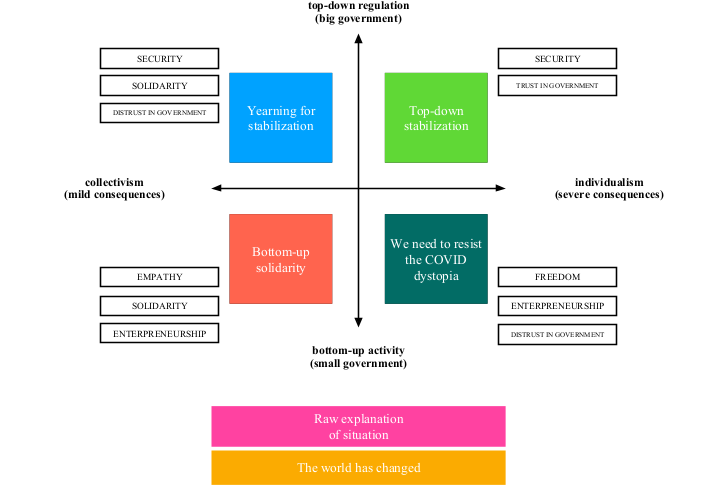On Friday, December 15, the European Narratives Observatory (NODES) presented the initial results from research on COVID-19 narratives. “Bridging the COVID-19 Narratives in Public Discourse” is the second case study in the NODES series “The Narratives that Shape our World”, which explores pivotal subjects essential for our democracies.
NODES researchers analysed a broad corpus of data in four European languages (English, French, Spanish and Polish) and were able to create a map of six dominant narratives associated with underlying values.
- Yearning for stabilisation: a narrative that treats COVID-19 as a serious threat, but focuses on critique of governments, institutions, elites, or big companies for their ineffectiveness, sluggishness, or greed.
- Top-down stabilization: a narrative that also treats COVID-19 as a serious threat, but sees institutions as a shield that can protect society against both the virus itself and the chaos that may result from the pandemic.
- Bottom-up solidarity: a narrative that treats COVID-19 as a serious threat and a major challenge to our humanity but presents different forms of bottom-up solidarity and responsible, altruistic behaviour to effectively mitigate the crisis.
- We need to resist the COVID dystopia: a narrative that does not consider COVID-19 a serious threat and alleges that the pandemic is used to justify the imposition of restrictions on individual freedoms, fostering a perceived dominance of so-called ‘experts’ and large corporations.
- Raw explanation: a narrative that focuses predominantly on elucidating the virus’s operational mechanisms and outlines potential effective preventive measures without providing specific recommendations or establishing guidelines. Furthermore, it presents the dynamic aspects of the current situation, such as the fluctuating numbers of casualties.
- The world has changed: a narrative that portrays the pandemic as a profound disruption that has brought about significant and dramatic changes to our world.
The COVID pandemic has significantly altered the world. In tandem with this transformation, the anti-vaccination movement that already existed began to spread. In many ways, this is part of a larger phenomenon of ‘anti-movement’ that can be observed when monitoring debates about climate change, migration, and gender issues, among others.
However, a careful analysis of these narratives suggests that it was never really about vaccines. The public discourse surrounding COVID-19 and preventative measures has served as a catalyst for broader societal conflicts, such as the tension between human interests and corporate influence, the balance between environmental protections and technological development, the struggle between individual rights and governmental authority, and the delicate equilibrium between individual freedom and collective solidarity.
NODES researchers came to the conclusion that even if COVID-19 is no longer at the centre of the public debate, understanding those narratives can help us predict other narratives likely to spread in the event of other epidemics or disasters. That’s because the same narrative matrix has been repeated in the context of lockdowns, vaccines, masks, and other preventive means and it is likely to be repeated in similar situations in the future.
